16 start with C start with C
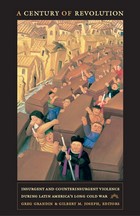
Contributors
Michelle Chase
Jeffrey L. Gould
Greg Grandin
Lillian Guerra
Forrest Hylton
Gilbert M. Joseph
Friedrich Katz
Thomas Miller Klubock
Neil Larsen
Arno J. Mayer
Carlota McAllister
Jocelyn Olcott
Gerardo Rénique
Corey Robin
Peter Winn

Informed and up to date, Challenged Sovereignty explains the effects of today’s globalized problems on the contemporary Caribbean.
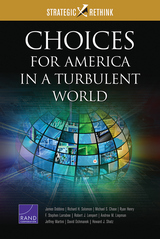
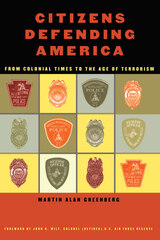
Today, concerns over homeland security have led thousands of Americans to volunteer for various citizen emergency response groups, such as the Civil Air Patrol, U.S. Coast Guard Auxiliary, Community Emergency Response Teams, fire units, etc. In Citizens Defending America, Martin Greenberg focuses new attention on the subject of citizen volunteerism by chronicling the nature and purpose of volunteer police units—authorized organizations of a public or private nature that work at deterring crime and/or preventing terrorism for little or no monetary compensation—in America since 1620. A number of these historical groups responsible for maintaining the civil order of the day—slave patrols, frontier posses, vice suppression societies, the American Protective League, for example—now seem controversial when viewed through a contemporary lens. Greenberg uses the history of such groups to reflect upon the nation’s past and to consider the possibilities for a safe and secure future. He also emphasizes the role of young people in the fields of security and safety, and stresses the need for more qualified, trained volunteers to help cope with man-made and natural disasters.
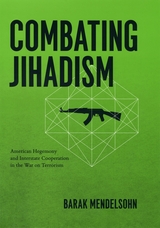
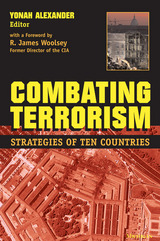
All of the essays address the same set of questions to allow for cross-national comparison of strategies and an assessment of counterterrorism practices:
What is the governmental and public perception of the sources of terrorism? How successful have the policies of governments been in combating both domestic and international terrorism? What factors influence a government's willingness and ability to cooperate with other countries in combating terrorism? To what degree are the terrorist realities and the concerns of governments interconnected with global terrorism? To what degree are certain countries "natural hosts" of either terrorist groups or propensities that target Western or closely allied interests? To what degree are terrorist organizations mainly concerned about winning political participation in their target countries? Which counterterrorism strategies work, and which do not? What are the lessons of past experiences for future counterterrorism responses at the national, regional, and global levels?
The conclusion to the volume summarizes the lessons that may be learned from the experiences of the ten countries and discusses a list of best practices in counterterrorism.
This book will be of interest to policymakers, scholars, and other individuals with professional responsibilities in the area of terrorism and security studies. Written in clear, accessible prose, this book will also appeal to the general reader who is interested in gaining insight into the array of issues facing governments that endeavor to combat terrorism, and into the possible solutions to one of the foremost threats to world peace in our time.
Yonah Alexander is Professor and Director, Inter-University Center for Terrorism Studies; Senior Fellow and Director, International Center for Terrorism Studies, Potomac Institute for Policy Studies; and Co-Director, Inter-University Center for Legal Studies, International Law Institute.

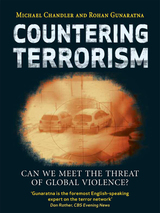
Five years after 9/11, we question whether or not terrorist activity has actually decreased. Terrorist networks still span the globe and, some argue, they are more powerful than ever. Yet in this era of rigid security and U.S.-led wars on multiple continents, countries are at odds about how to deal with the looming threat—and chaotic aftermath—of terrorist acts. In Countering Terrorism, Rohan Gunaratna and Michael Chandler sift through political commentary, military maneuvering, and the tangled web of international diplomacy to put us on alert: The world has missed a prime opportunity to crush terrorism.
Chandler and Gunaratna are among the world’s foremost experts on international terrorism, having logged between them over forty years of firsthand experience in the field and planning rooms, analyzing and dealing with an unceasing succession of terrorist threats and conflicts. Chandler and Gunaratna employ their unparalleled expertise to probe the catastrophic attacks so indelibly seared into the history of the early twenty-first century, from 9/11 to the Madrid bombings to deadly strikes in Afghanistan, Iraq, Pakistan, Palestine, and elsewhere. They ask the hard questions we never hear on nightly newscasts: Why has the overall response to terrorism after 9/11 been “so abysmal, slow, piecemeal, and to a large extent far from effective?” Why have some countries, despite international criticism, disregarded universally accepted humanitarian norms when handling the prosecution of terrorist suspects?
By allowing politics to trump the need for trans-national cooperation, the authors contend, the international community—and particularly the United States—has squandered an opportunity to combat terrorism with a united and powerful force. Thus what should have been a watershed moment in international relations vanished as effective long-term policies were shunned in favor of short-term political expediency.
From arguing the Iraq War has been a “strategic defeat” to Afghanistan’s struggle against the Taliban to the rapidly growing geopolitical role of Iran, Countering Terrorism investigates the reality of the changes that followed the bombings and attacks and examines global terrorism from every angle, including the social and economic underpinnings of terror networks. Scholars, experts, and citizens have appealed for a re-evaluation of today’s increasingly ineffective “War on Terror” policies, and Chandler and Gunaratna answer this call with clear and concise proposals for future dealings with global terrorism.
The projected end results of the wars, terrorist attacks, and political upheavals tearing nations apart today are rarely anything but bleak. But Countering Terrorism challenges today’s chaotic status quo, offering penetrating analysis and a radically new perspective essential to grappling with the complexities of terrorist activity and counterintelligence today.
"A timely book that fills a lacuna in the counter-terrorism literature and has to be on the bookshelf of any decision-maker, scholar, student and anyone who is interested in understanding the current and the future trends of international terrorism and the strategies that has to be taken to combat this threat."--Dr. Boaz Ganor, author of The Counter-Terrorism Puzzle: A Guide for Decisionmakers
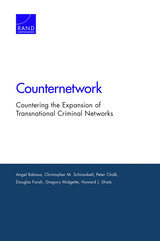
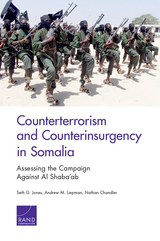
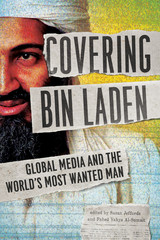
In Covering Bin Laden, editors Susan Jeffords and Fahed Yahya Al-Sumait collect perspectives from global scholars exploring a startling premise: that media depictions of Bin Laden not only diverge but often contradict each other, depending on the media provider and format, the place in which the depiction is presented, and the viewer's political and cultural background. The contributors analyze the representations of the many Bin Ladens, ranging from Al Jazeera broadcasts to video games. They examine the media's dominant role in shaping our understanding of terrorists and why/how they should be feared, and they engage with the ways the mosaic of Bin Laden images and narratives have influenced policies and actions around the world.
Contributors include Fahed Al-Sumait, Saranaz Barforoush, Aditi Bhatia, Purnima Bose, Ryan Croken, Simon Ferrari, Andrew Hill, Richard Jackson, Susan Jeffords, Joanna Margueritte-Giecewicz, Noha Mellor, Susan Moeller, Brigitte Nacos, Courtney C. Radsch, and Alexander Spencer.
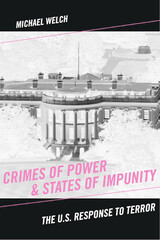
Welch continues the work he began in Scapegoats of September 11th and argues that current U.S. policies, many enacted after the attacks, undermine basic human rights and violate domestic and international law. He recounts these offenses and analyzes the system that sanctions them, offering fresh insight into the complex relationship between power and state crime. Welch critically examines the unlawful enemy combatant designation, Guantanamo Bay, recent torture cases, and collateral damage relating to the war in Iraq. This book transcends important legal arguments as Welch strives for a broader sociological interpretation of what transpired early this century, analyzing the abuses of power that jeopardize our safety and security.
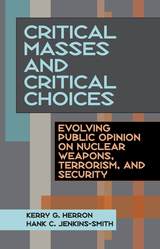
Critical Masses and Critical Choices examines American attitudes on issues of national and international security. Based on over 13,000 in-depth interviews conducted over a ten-year period, Kerry Herron and Hank Jenkins-Smith have created a unique and rich set of data providing insights into public opinion on nuclear deterrence, terrorism, and other security issues from the end of the Cold War to the present day. Their goal is to shed light not only on changes in public opinion about a range of security-related policy issues, but also to gauge the depth of the public’s actual understanding of these matters. Prior to this study, the predominant view held that the American people were incapable of articulate and consistent thought on complex political subjects. This book overturns that notion and demonstrates the sometimes surprisingly cogent positions held by ordinary members of the public on intricate national issues.
The book’s solid data, based on long-term studies, combined with crisp writing and often startling conclusions, will appeal to a wide range of readers: scholars, journalists, and policy makers. Critical Masses and Critical Choices is the definitive account of the change in public perceptions on security threats and reactive strategies from the early 1990s to the post 9/11 period. This broad and highly original study will prove an indispensable tool for policy makers and scholars alike.
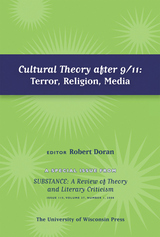
This collection of material seeks to interpret the events of September 11, 2001 from the perspective of cultural theory — that is, from the perspective of anthropological and social forces that motivate human beings and give meaning to their thoughts, actions, and feelings. Though contributors to this volume work within various disciplines, their approach is necessarily holistic—because of the very nature of the event, which resonates on many levels and in diverse spheres of human activity.
Clearly the perception of who one’s enemy is has a cultural and psychological impact that goes far beyond the superficial media representations consumed on a daily basis; the very curriculum of American universities has been altered as a result of the 9/11 attacks, and this will have profound and far-reaching effects.

In Cultures of Fear, a truly world-class line up of scholars explore the formation and normalisation of fear in the context of war and terrorism.
"Freedom from fear" is a universal right and fundamental for human well-being. People often look to governments, humanitarian agencies, and other institutions to further this aim. However, this book shows that these organisations often use the same "logic of fear" to monitor, control, and contain human beings in zones of violence.
This is an excellent interdisciplinary reader for students of anthropology, sociology and politics. Contributors include Noam Chomsky, Slavoj Zizek, Jean Baudrillard, Catharine MacKinnon, Neil Smith, Cynthia Enloe, David L. Altheide, Cynthia Cockburn and Carolyn Nordstrum.
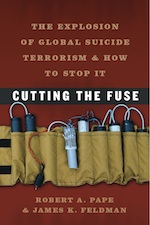
READERS
Browse our collection.
PUBLISHERS
See BiblioVault's publisher services.
STUDENT SERVICES
Files for college accessibility offices.
UChicago Accessibility Resources
home | accessibility | search | about | contact us
BiblioVault ® 2001 - 2024
The University of Chicago Press









